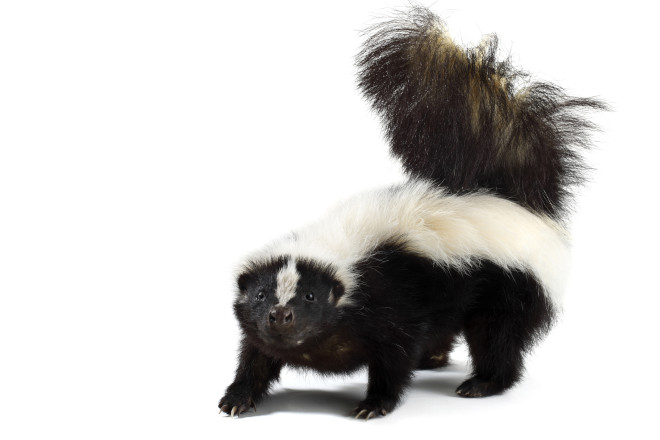The Skunk is a very well evolved animal. They have a spectacular weapon that can give evolution a run for its money. Their spray is so powerful that the molecules still produce a profuse and violent occur even at eleven parts per million which a chemically microscopic amount. You can scrub and wash whatever was sprayed, including you or your pet but getting those last few molecules off is nearly impossible. This is why the scent is prevalent and long-lasting. The violent scent is nearly impossible to get rid of and this means if a skunk sprays on your property you will have to deal with the smell for a very long time.
The most common time of year for skunks to spray is matting season. This lasts from early February to late June and can continue into July. The males will travel miles when normally they would be restricted to a half-mile area, they now travel up to five miles per day in search of a mate. This results in skunks quite literally everywhere for February and March. After that, the older females will have a litter of four to six pups. The young females, referred to as yearling females who were born the year before do not mate until June and will have immobile pups usually in July.
This is complex but if you pay attention to the times of the year and prepare your property then you can avoid skunk mating season entirely. Otherwise, they are rarely a major problem. Skunks only have one litter annually so one of the families on your property is old enough, about four more months in the fall. The skunk family will separate and they will likely vacate your property to start the process over again.
Skunks are also strange in the way they search for food. They tend to be omnivores in the fall and winter, getting desperate to eat anything they can find including roots and vegetables. In the summer and spring, they enjoy a protein-oriented die of mice and insects. If you are wondering why the skunks are tearing your lawn and garden apart in the summer it is not for your vegetables. They are looking for grubs and will overturn an entire lawn to find them. This results in large chunks of grass that have been dun under and flipped to access grubs as well as conical holes in the ground which are not burrows but access points to find grubs and other insects.
To prevent this burrowing and lawn-ruining activity you will need to use domestic pesticides. The best is a mix in a large container you can attach your hose to, this makes the job much easier. Treat the lawn in the early spring and do it again mid-summer. That is it, just two treatments per year and your lawn will be insectless and through that, skunks. However, if a female skunk enters your property looking to make a nest it will likely burrow under a human-made structure like a shed. Limiting the food on your property can help prevent this but if it has already started you will want to call a professional to resolve the situation. Call Skunk Control today for guaranteed skunk removal in Toronto and beyond.

